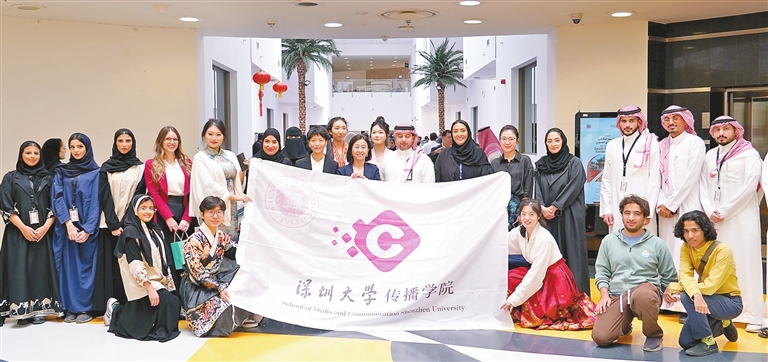
Zhou Juanshu 2322681269@qq.com FOR Zhang Xinying, director of the Confucius Institute at Prince Sultan University (PSU), the challenges of her role in Saudi Arabia bring to mind the rigorous preparation for China’s national college entrance exam. “It’s tough and overwhelming, but it’s also an unforgettable journey,” said Zhang. Established on June 4, 2023, the Confucius Institute at PSU is a joint initiative between Shenzhen University (SZU) and PSU. It is SZU’s first overseas Confucius Institute and the first in Riyadh, Saudi Arabia, underscoring SZU’s expanding international reach and the deepening ties between China and Saudi Arabia. Amid these circumstances, Zhang, who taught at SZU for over 20 years, eagerly stepped into the role of the institute’s director. “I wasn’t seeking comfort. I wanted to embrace the unknown, learn new skills, and keep my mind active every day,” she explained. Yet, the reality proved more challenging than she had expected. Unlike Confucius Institutes in developed countries or regions with sizable Chinese communities, the Riyadh institute faces unique obstacles. “There were no existing models to follow,” Zhang explained. “We had to figure it all out ourselves.” Saudi Arabia only began issuing travel visas in 2019. “Though the country is gradually opening up, the pace is slow. Establishing cooperation and overcoming cultural barriers have been the major challenges,” Zhang added. Lin Jiazhao, an assistant professor from SZU, shares a similar perspective. Having previously taught at the Confucius Institute at the University of Utah, he believes cultural exchange should go beyond language classes. For Lin, it’s about finding creative ways to make learning enjoyable, such as through games, films, or even artificial intelligence. As a result, the institute’s curriculum is not focused on advanced language instruction but on making Chinese easier to learn while fostering interest in and acceptance of Chinese culture. Zhang acknowledges that students may not achieve fluency in Chinese through these classes, but sparking their curiosity about China is a meaningful step. “We can become friends, and they may later contribute to the relationship between our two countries. In that sense, our efforts are not in vain,” she explained. Over the past year, the Confucius Institute has organized a range of intercultural events, fostering meaningful cultural exchanges among students. In January 2024, a delegation from Tsinghua University visited, excelling in meetings and supporting a Lunar New Year event. In April, 21 Saudi students traveled to China, reuniting with their Tsinghua friends in Beijing. “This is real cultural exchange,” said Zhang. “These students are building lasting friendships.” During their trip, the Saudi students also visited Shenzhen, where they engaged with students from SZU. To build on this momentum, Zhang and the university organized a reciprocal visit in October, bringing SZU students to Saudi Arabia to further strengthen these ties. Through these exchanges, young people from both countries have gained genuine insight into each other’s modern culture, national development, and shared challenges. Reflecting on her journey, Zhang acknowledged that the significant cultural differences between the two countries occasionally made her contemplate giving up. Yet, witnessing the sincere friendships that formed between the youth of both countries, she concluded, “Coming to Saudi Arabia was absolutely the right decision.” | 
